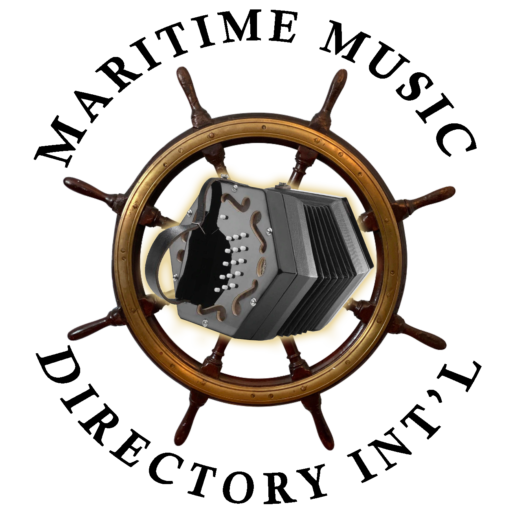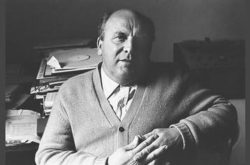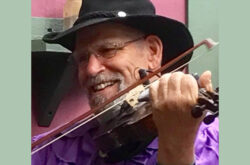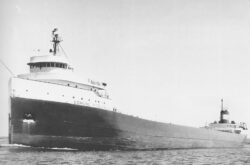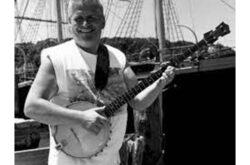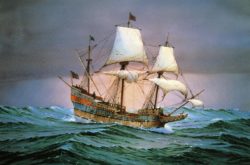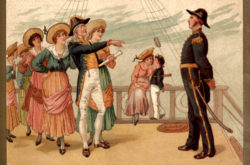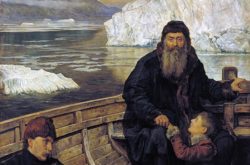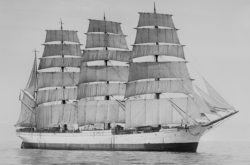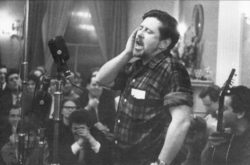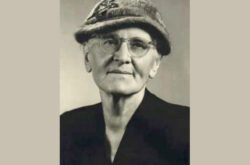23 Sept 1991 Peter Bellamy Dies
Peter Franklyn Bellamy (8 September 1944 – 24 September 1991) was an English folk singer. He was a founding member of The Young Tradition and also had a long solo career, recording numerous albums . . .
Albert Lancaster Lloyd, aka A. L. Lloyd or Bert Lloyd dies
Albert Lancaster Lloyd, usually known as A. L. Lloyd or Bert Lloyd, was an English folk singer and collector of folk songs, and as such was a key figure in the British folk revival of the 1950s and . . .
Albert Lancaster Lloyd, aka A. L. Lloyd or Bert Lloyd dies (29 Sept 1982)
Albert Lancaster Lloyd, usually known as A. L. Lloyd or Bert Lloyd, was an English folk singer and collector of folk songs, and as such was a key figure in the British folk revival of the 1950s and . . .
Bruce Macartney Jr. Dies (2019)
Bruce Jesse Macartney Jr., 70 of Midland, died Thursday morning, September 5, 2019 at the MidMichigan Regional Medical Center. He was born May 22, 1949 in Philadelphia, . . .
Cargo ship suddenly sinks in Lake Superior (1975)
On November 10, 1975, the SS Edmund Fitzgerald sinks in Lake Superior, killing all 29 crew members on board. It was the worst single accident in Lake Superior’s history.
The . . .
Construction on the Erie Canal begins 4 July 1817
On July 4, 1817, workers break ground on the Erie Canal at Rome, New York. The canal, completed in 1825, links the eastern seaboard with the Midwest and transforms New York . . .
Don Sineti Dies 1/5/2023
Don Sineti , folksinger, songwriter, part-time sea chanteyman at historic Mystic Seaport Museum (with one of the most powerful voices on the Eastern Seaboard!), and long-neck, . . .
Ed Trickett Dies on May 10, 2022
Ed was a well-loved musician in the folk music community. He appeared on over 40 recordings, most of them with Folk Legacy Records, now part of the Smithsonian Folkways Recordings. His discography includes . . .
Francis Drake circumnavigates the globe (1580)
English seaman Francis Drake returns to Plymouth, England, in the Golden Hind, becoming the first British navigator to sail the earth.
On December 13, . . .
Gilbert & Sullivan’s “HMS Pinafore” premieres (1878)
By the spring of 1877, the English light-opera team of W.S. Gilbert and Richard Sullivan had established a strong reputation based on several well-received earlier works, . . .
Henry Hudson Set Adrift by Mutineers (1611)
After spending a winter trapped by ice in present-day Hudson Bay, the starving crew of the Discovery mutinies against its captain, English navigator Henry Hudson, and sets . . .
Herzogin Cecile grounds on Ham Stone Rock (1935)
With Sven Erikson as her captain and Elis Karlsson her first mate, the ship left Port Lincoln in South Australia on 21 January 1935, with a cargo of wheat, and after taking . . .
Hythe folk singer Kerry Hearn died in a crash on the A20
On this date in 2014, Hythe folk singer Kerry Hearn died in a crash on the A20 in 2014. He was a member of the folk music band, Quidnunc. He left behind his loving wife, Mandy Hearn and musical . . .
Interesting NPR show on sea shanties, pirates, lighthouses, white whales and more
This is an interesting listen for maritime music and sea shanty fans. Interviewer Davis Dunavin features some prominent names from the contemporary music scene, along with . . .
Jack Forbes Dies (2016)
Jack Forbes was a member of the Hoy Shanty Crew and Slow Loris. Jack passed away on January 30, 2016. He was the author of the much-covered modern maritime song, Rolling . . .
James Henry Miller aka Ewan MacColl dies
(25 January 1915 – 22 October 1989)
James Henry Miller, better known by his stage name Ewan MacColl, was a folk singer-songwriter, folk song collector, labor activist and actor. Wikipedia
You can view . . .
James Henry Miller aka Ewan MacColl dies (1989)
James Henry Miller (25 January 1915 – 22 October 1989), better known by his stage name Ewan MacColl, was a folk singer-songwriter, folk song collector, labour activist . . .
Joanna Colcord Dies (1960)
Joanna Carver Colcord (March 18, 1882 – April 8, 1960) was pioneering social worker, and author. Born at sea, she was also notable for publishing texts on the language, . . .
Joanna Colcord Dies (8 April 1960)
Joanna Carver Colcord (March 18, 1882 – April 8, 1960) was pioneering social worker, and author. Born at sea, she was also notable for publishing texts on the language, . . .
Johnny Collins Dies
Johnny Collins Dies (July 6, 2009)
Johnny Collins was one of the signature voices on the maritime music scene since his beginnings in London jazz and folk clubs in 1956. He was a sought-after performer at many folk and maritime festivals. He and his friend, Jim Mageean, were cornerstone performers at the Liereliet festival in Workum for decades, their album “Coming of Age” documenting this accomplishment.
He died on 6 July 2009 while on tour in Gdańsk, Poland, aged 71.
